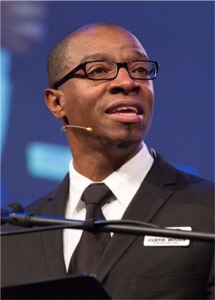
Bowling Green — Drawing on the “Tell Your Story” theme of the convention, Curtis Woods pointed to Jonah 1 in exhorting believers to “rethink mercy and tell your story.”
Woods, asssociate executive director for convention relations & communications for the Kentucky Baptist Convention, preached the convention sermon at the Annual Meeting of the Kentucky Baptist Convention in Bowling Green.
One key to faithfully sharing one’s testimony with others is to recall the extent of God’s mercy shown to oneself, Woods said. And Jonah and his story as a reluctant prophet demonstrate the consequences of losing sight of God’s lavish mercy, he said.
Selfish people “have forgotten that everything they have is because of mercy,” Woods said. Perhaps Jonah was reluctant to offer God’s mercy to the Ninevites because he had forgotten how merciful God had first been to him, he suggested.
Woods wedded unction with exegetical care as he used his own spiritual biography to illustrate his point about recalling the Lord’s mercy.
The fall of 1993 was one of the hardest periods of his life, he shared. He was a college dropout. His grandmother had died in September; then his parents divorced after 22 years of marriage.
“My heart was broken. I was spinning out of control trying to squelch my pain through riotous living and self-worship,” Woods recalled.” My broken heart gave me license to break the hearts of others. I was an angry young man.”
But then a fraternity brother, Moses Chism, invited Woods to join his family for Thanksgiving. Chism, a strong Christian, took an interest in Woods, despite the fact that Woods confessed to taking his anger out on Chism.
Woods, a Muslim at the time, observed Christian love and began studying Psalms. Under deep conviction, yet simultaneously filled with hope, Woods confessed his faith in Christ in January the following year. “Moses in his life decided to show me this beautiful thing called ‘mercy’,” Woods reflected.
As Christians tell their stories of God’s mercy, Woods reminded the congregation that God is in charge. Just as “the word of the Lord came to Jonah (1:1), “Your story doesn’t belong to you. In a very real sense, your story belongs to God,” Woods stressed. But failure to tell the story of God’s grace will invite God’s judgment on believers, he warned, even as it did on Jonah.
Jonah 1 contains an embarrassing role reversal, he observed. After the sailors learn they were caught in a storm because Jonah was running form the Lord, Jonah offered to be thrown into the sea to appease God and save the rest of the crew. But the sailors initially tried to fight the storm and row to dry ground. They were trying to save Jonah, he explained.
“These unbelieving sailors are willing to do for Jonah what Jonah was unwilling to do for the Ninevites,” Woods said. “We cannot allow unbelievers who do not know God to outstrip us in showing mercy to the lost.”
According to Woods, the story of Jonah offers a subtle corrective to those whose who argue that God is only concerned about those who are oppressed. The Assyrians in Nineveh were known for their evil deeds, but God’s call on Jonah highlights that God is concerned about the oppressed and the oppressor.
The Lord’s mercy is so expansive, as Woods noted in his conclusion, because there was another prophet who was in the belly of the earth for three days.
Prior to coming on staff with the KBC in 2006, Woods directed evangelism and missions at Oak Cliff Bible Fellowship in Dallas. Woods is a member of Watson Memorial Baptist Church and is a Ph.D. candidate at Southern Seminary, where he is studying biblical spirituality and church history. (WR)
Rick Hardison